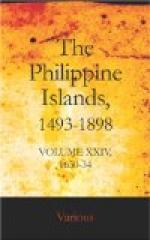On the twenty-second of April, 1602, the chapter was convened in the house at Manila. Father Fray Pedro Arce, who is now bishop of the city of Santisimo Nombre de Jesus, and who has twice governed the archbishopric of Manila, was elected in it. Father Fray Mateo de Mendoza presided at that election, while father Fray Juan de Montesdoza was the absolute provincial, as we call it, or the freed one, since now he is no longer provincial. The first definitor was Fray Agustin de Tapia, the second, Fray Bernabe de Villalobos, the third, Fray Diego de Zerrabe, and the fourth, Fray Diego de Salcedo. As visitors were elected Fray Juan Bautista de Montoya and Fray Francisco Serrano. [3] All, having assembled, as our rules ordered, enacted very wholesome regulations, and provided for the province with those mandates, which were seen to be more necessary at that time, in order to check thereby the boldness of certain men, who were giving room for the decay of the province, which in nothing loses more than by permitting it to relax in its rigor. For even there it is said that the bow must sometimes loose the string which holds it bent, in order to give it rest and so that it may not break. I grieve over this, that it is said in the order, so that at times some reasonable recreation may be allowed; but in that which touches the essential aspects of it, it does not seem right that it be lost, for never have I seen that what is once lost in point of religion is regained. It appeared, therefore, easier to our father St. Ignatius to found a new order than to reform an old one, where its members were already used to such and such a manner of life. It is a hard thing, when established, to reduce them to a greater degree of virtue. And since those men must remain in the same order, it is always an impossible thing to reduce them to that which they have never observed....
Father Fray Pedro de Arce, who was chosen at this elevation, was such a person that, were I to praise him, I think, that my tongue would do him an injury, for another pen and another language must tell his virtues. He came to this province as a lay brother. He was ordained here and completed his studies, and always gave signs of what he was to become; for his modesty, his charity, his devotion, even while a brother, appeared so conspicuous, and were increasing in such a manner, that not only were the islands full of his good name and great virtues, but they even came to the ears of Felipe iii, who presented him for the bishopric of Santisimo Nombre de Jesus. While in this country, the decree of the year 1610 was sent him, which caused the holy man considerable vexation, so that he did not know what to do; for it seemed a grievous thing for him to abandon the quietness of his cell, and to exchange it for the majesty of a bishop, to which he was not inclined. Accordingly, he resigned the bishopric into the hands of the father master Fray Pedro Solier, [4] who was provincial at




